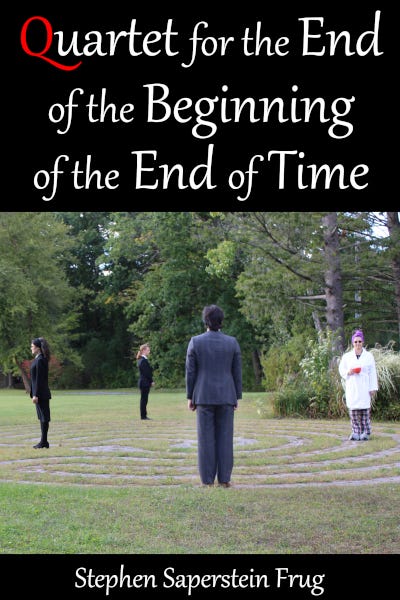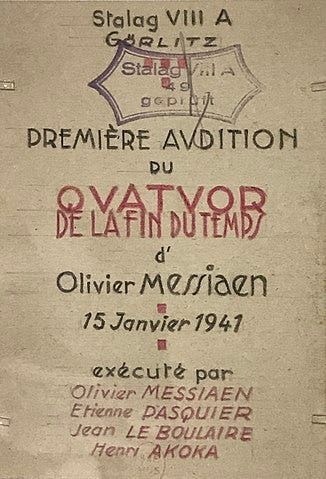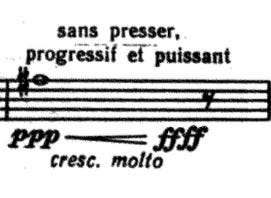Retcon Movement Two has begun!
The first story, "Quartet for the End of the Beginning of the End of Time", is now available, and a Number of Related Announcements, Observations, and Jokes
If I were Camus, I might start this announcement like this:
“Quartet for the End of the Beginning of the End of Time” was published today. Or perhaps yesterday, I don’t know. I submitted it to the ebook vendors, but that doesn’t mean anything. It might have been yesterday.
But however existential you wish to get about the matter, the first book of the second movement of Retcon—a movement1 whose overall title is Contingency, just as the first movement was called Necessity—is now out in the world (at least as bits, not yet as paper (more on that anon)), and you should go get a copy and read it! You can get a copy at my web site, at Amazon (or at Amazon UK or any of the other Amazons), at Apple Books, at Barnes and Noble, at Kobo, or at Smashwords. Here’s what the cover looks like:

What is this Retcon thing you are mentioning?
(Longer-time readers might want to skip to the next section down.)
I am publishing a mosaic story, which is my preferred name for the most popular form of storytelling in our contemporary culture: a series of related stories, set in the same world and staring the same characters (often with focus on different people from installment to installment), in which each story stands on its own (to a greater or lesser degree, depending on the work), but which, when read (watched, listened to, etc) as a whole, it makes up a larger story—one big story made up of many smaller ones (hence, mosaic) . This is the format in which most TV shows are made these days, as well as comics, an increasing number of movies, and even a lot of prose fiction if you think about book series; I consider it an oddity (to to mention an inconvenience) that there is no accepted term for all of these works, as familiar as “novel”, and no less able to cover multiple different formats than ‘novel’ which manages to comfortable house works as different in form, shape and feel as Pride and Prejudice, Bleak House (published in monthly installments!), Ulysses, In Search of Lost Time (published in seven volumes), Pale Fire, The Fifth Head of Cerebus, Red Plenty, and Aegypt.
In Retcon in particular, I am publishing a series of short stories (technically, for those of you who track these things, they’re novelettes, with the occasional border incursion into the territory of the novella). There will be a total of 27 of them, organized in three movements (what a tv show would call “seasons”).2 I have, thus far, published the entirety of the first movement and, as of today (ou peut-être hier, je ne sais pas), the first story of the second movement. They aspire to come out monthly, but sometimes, as in all things which come from a fallible race from upon a broken earth within a fallen world, fall short. I do my best, Forgiving Reader, I really do. But the one after this one will be published in two months.
What is Retcon about? Well, here’s the set-up for the story as a whole:
In 1951, a pair of scientists at Cornell discovered time-travel. With the specter of the atomic bomb in the immediate background, they decide not to replicate Einstein's mistake of suggesting what might be a weapon to the political authorities. Instead, they decide to set up a clandestine research program, swearing all those who work on it to keep the secret.
Then, in 1991, a time traveler returns from 2031 with a disturbing message: no traveler and no message has ever come farther back from the moment in time when he left. No one knows why. All people know is that something happens on April 4, 2031, to prevent any news of the future.
This is the story of what happens next... if "next" is the right word for a narrative which, in the way of things, is necessarily non-linear.
And, for the curious, here is the list of the stories that have been published so far:
Movement One: Necessity 1. Zero Second 2. Years Scattered Like Fallen Leaves 3. Xu Ming’s Second Time Down 4. While Unbeknownst to the Rest, the Woman in the Yellow Dress was Also a Time Traveler 5. Very Soon and Yet Still Very Far Away 6. Unless Another Escape to Tell Thee 7. Thus in Time Are We All Devoured 8. Screaming in Circles 9. Retcon Movement two: Contingency 10. Quartet for the End of the Beginning of the End of Time 11. Paradigm Slip: Paradigm Slippage: Paradigm Boogie-Woogie (forthcoming December 9, 2024)
And that brings us up to date.
We know all that. Tell us about your new story!
That’s the problem, isn’t it? How do I tell you what it's about? This is the first story of the second movement of the story. Things actually happen in the first movement, things are revealed and hinted at, and I don't want to spoil it for anyone. Its surprises may not be as well buried as in a lupine tale, but they are the best I could lay, and I would like to give the honest reader a chance to trip into them, or skip around them, rather than spoil them by saying “no, no, ignore that, come look at this new, shinny thing”.
Now, gentle reader, you might object that I put myself in this situation: it was my idea to write a story distributed into many tales; what did I think I was getting into?

You have a point. But still: we all have our strengths and weaknesses in our jobs, and of all the genres, blurbs and sales pitches are simply not my strongest suit.
Here’s what I came up with:
The secret research program at Cornell University has made a terrifying and powerful discovery, and the whole aim and focus of their work will change. In the course of negotiating this change, two older scientists studying time travel visit their younger selves, an archive is built, a robbery is attempted, and a historian and an historian are both hired. Things start to go wrong, of course, but with time travel, you always get another mulligan. Which is good, because this go around they'll need it.
The first sentence, of course, is my attempt to have my cake and eat it too as far as spoiling the surprises of the first movement. The second was influenced by the subtitles of Neil Gaiman’s Season of Mists, since I have been listening to a podcast about it. And the third because I needed a hook.
But honestly? It’s a meh job. It doesn’t convey what the story is about. Not that I can’t do that; I can do that, did: but it took me about 20,000 words. And it conveys the matter even better if you read the previous nine stories in the series, too.
I do think, however, that the story’s title did a somewhat better job at that than the blurb.
That title sounds awfully familiar
That may be because it is a pastiche of a famous title. The French composer Olivier Messiaen (1908-1992) wrote a famous piece called Quartet for the End of Time (Quatuor pour la fin du temps), which is famous not only for its music or even its (superb) title, but because of the circumstances of its composition. Messiaen was in the French army in World War Two, and was captured and interned in a German prisoner of war camp. While in the camp he was able (thanks to a sympathetic, music-loving guard) to write a piece of music for the four instruments which happened to be available in the prisoner of war camp (meaning both physical instruments and players, I believe): a piano, a cello, a violin, and a clarinet. This was an unusual combination of instruments, not a standard chamber music ensemble (although since Messiaen—I believe largely due to his influence—it has been used by a number of other composers, most famously in John Williams’s arrangement of Aaron Copeland’s “Simple Gifts”, which was created for and performed at Obama’s inauguration). The piece’s debut was on January 15, 1941, in the Stalag VIII-A prisoner of war camp, before an audience of prisoners and guards.

A combination of the quality of Messiaen’s music and the rather remarkable tale of its creation has made Messiaen’s quartet one of the signal pieces of twentieth century classical music.
It is worth noting, by the way, that what Messiaen meant by “end of time” was not at all what I (at least) first thought he meant. I took the title to be an apocalyptic vision, an “end of all things” in the sense of horror and despair overwhelming the world—what I would have imagined feeling in a German prisoner of war camp in WW2. But Messiaen, whose music is mostly religious music, meant it in an uplifting sense, the end in a positive Christian vision; and titles of the movements include “Praise to the Eternity of Jesus”, “Praise to the Immortality of Jesus”, and “Vocalise, for the Angel who announces the end of time”. More prosaically, Messiaen is also talking about his musical technique: he means the end of musical time, in which rhythm is abandoned, ignored, set aside (which he doesn’t entirely do—parts are quite rhythmic, at least to my ears—but he does make a habit of adding in extra notes regardless of the time signature on the sheet, simply shoving them in at will.
And of course I mean “the end of time” differently either than Messiaen was thought to or than Messiaen actually did, but you’ll have to read the story—actually, you’ll have to read the whole of Retcon, which you can’t do quite yet—to understand what I do mean.
But in honor of my title’s inspiration, I chose an apt quote from Messiaen as an epigraph for the story. I was tempted by this quote from Messiaen’s composer’s notes to his piece:
Music of stone, formidable granite sound; irresistible movement of steel, huge blocks of purple rage, icy drunkenness.
…but the temptation was because that’s a marvelous sentence that would work well for an epigraph for something, rather than because it fit my story. Happily, there was a different quote from Messiaen that fit it very well. That quote is this:
This quote, obviously, is from Messiaen’s score, rather than his introduction. Using a bit of music as an epigraph is not unprecedented,3 but it is, I believe, rare. This measure is from the third of Messiaen’s eight movements, “Abyss of Birds”, which is a clarinet solo. Some more musically knowledgeable friends with whom I discussed the piece didn’t like that movement nearly as much as the others, but I was quite taken by it. For those whose musical knowledge is limited (as mine is), here is what the measure in question sounds like:
But of course to understand what it means you need to listen to it in the context of the whole movement, and to really understand the movement you need to listen to it in the context of the work as a whole. (The first three movements are less accessible than the rest of the piece; if you get stuck, persevere, or skip, and try it starting with movement four.)
The other epigraph, incidentally, is from T. S. Eliot’s poem cycle Four Quartets—yes, I am driving the quartet theme into the ground, which you will definitely see more evidence of if you read the story—in particular the first poem in the cycle, “Burnt Norton”—and goes as follows:
Footfalls echo in the memory Down the passage which we did not take Towards the door we never opened
Which, obviously, fit the story, or I wouldn’t have used it; but I will admit that it is from a piece called “four quartets” also factored heavily in my thinking.
I’m sold, where can I buy a copy?
You can buy a copy at my website (where you can also just buy a subscription to the series, if you prefer (you’ll get all past issues instantly and then new ones as they are released)). You can also buy it at Amazon (or at Amazon UK or any of the other Amazons), at Apple Books, at Barnes and Noble, at Kobo, or at Smashwords.
You gave all those links already at the top of the post
I know, but this is a post to sell books. I’ll probably give them again before we’re done.
Wait, your subtitle promised announcements. Were there announcements?
Did it do that? Nasty little creature. Never trust a subtitle.
Well, the eleventh story in the series will be titled “Paradigm Shift: Paradigm Slippage: Paradigm Boogie-Woogie”, and it will be published on December 9, 2024—alas, despite my hopes I am not yet confident about being on a monthly schedule.
The other announcement is that there is, currently in preparation, a print edition of season movement one, which will be published under the title Necessity: Movement One of Retcon sometime next year. It will contain the first nine stories of the series, as well as a few extras whose nature I don’t want to spoil. There will also be an ebook version of the collection in case anyone wants to pick up the first nine stories as a single bundle.
Any closing comments?
Yes, three:
Thanks for reading!
I hope to have a proper essay out soon, possibly next week. You should subscribe so you don’t miss it:
Oh, and those links are: buy a copy at my website (where you can also just buy a subscription to the series), or buy it at Amazon (or at Amazon UK or any of the other Amazons), or at Apple Books, or at Barnes and Noble, or at Kobo, or at Smashwords.
I chose the term “movement” because “series” was confusing (the whole thing is a series, after all), and because what seems like the obvious term, “season”, is so closely tied to television. But of course now many comics have “seasons”, and even some prose fictions do too, so it is probably quixotic if not foolish of me to hold out. I will admit I am taking bets with myself as to how long I do so. “Forever” is not getting great odds, although it’s not completely impossible, of course.
See above, footnote 1.
The most famous case that I am aware of is that W. E. B. DuBois used a bar of music from what he called the “sorrow songs” to introduce each chapter of his masterpiece Souls of Black Folk, but I know I have seen others too.


